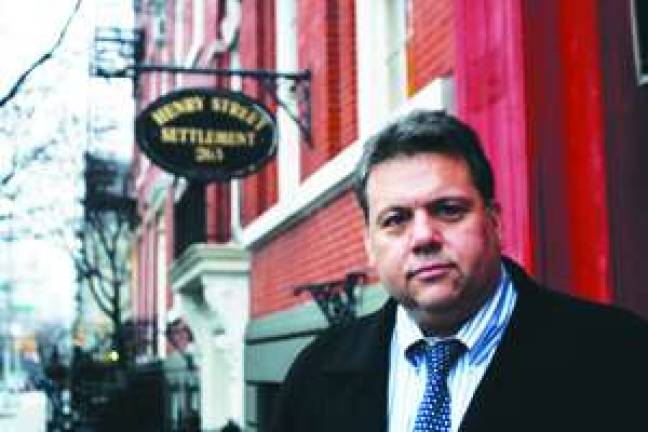Lower East Side Leader Provided Direly Needed Help Post-Sandy

David Garza worked with Henry Street Settlement team to keep food and assistance flowing in the wake of the storm by Emily Johnson In the first days after Hurricane Sandy, thousands in downtown Manhattan were stranded in cold, dark apartments. FEMA, flush with disaster relief funds, had the resources to send a truck with 22,000 much-needed meals to the Lower East Side. But when it came to actually getting that food into the mouths of hungry New Yorkers, the agency looked to a local organization that has spent more than a century getting to know the neighborhood from the ground up. "We realized the value of our Meals on Wheels distribution routes," said David Garza, the executive director of Henry Street Settlement, a nonprofit social service agency that has served the Lower East Side since the late 1800s. "We are a coordinating entity that distributes 1,200 meals a day to seniors, so quite literally we could do that work in the dark." And they did. Working by candlelight and flashlight and relying on smartphones and social media to coordinate volunteers in the absence of power and Wi-Fi, Garza and his Henry Street team oversaw an exhaustive door-to-door relief effort. They printed out maps and mobilized a brigade of volunteers on bicycles to canvas each building and follow up with food deliveries. "Obviously the most severe challenge was the power outage," Garza said. "The LES is a vertical area. People being trapped in buildings was the obvious and immediate concern. So we focused on identifying where and who needed supplies-for example, we'd get a tweet saying, 'I have an old relative stuck in this apartment, can you help?'" In many ways, the relief effort was not much of a departure from business as usual for Henry Street Settlement, which runs residential facilities, assists with job placement and offers senior services and youth programs to the largely low-income community. But Garza had never before encountered this level of need. "People here always live on the precipice of poverty," Garza said. "But what the storm has done is intensify that so they have to choose between food and rent. I was overwhelmed a couple of times. At one point literally right in front of Henry Street where we were distributing food ? people were civil, but the need was palpable as lines formed. That really hit home. How incessant the need was. It really struck me, 'Thank God we're here, what would they be doing?'" During the blackout, Garza drove into the city daily at 5:30 a.m. to beat the HOV lane restrictions and stayed well into the evening. He was in regular phone communication with Assembly Speaker Sheldon Silver to articulate what steps needed to be taken. The speaker, who nominated Garza for the OTTY Award along with Chris Kui of Asian Americans for Equality, called the men "passionate, hard-working, organized members of the community" and credited them with saving lives. "As soon as the storm hit, David was in immediate contact with my office," Silver said. "He mobilized volunteers. He mobilized trucks to pick up FEMA supplies, he also had volunteers knock on doors and the National Guard deliver food supplies, meals and water." When the power finally came back on, Garza said, it brought a memorable end to what for many had become paralyzing uncertainty. "You would think your local team won the Super Bowl," he said, smiling. "You could hear it out in the street. It was emotional, because it had been palpable that we were in crisis. That nor'easter was bearing down. It was getting dangerous." With the immediate crisis behind them, Henry Street Settlement is gearing its efforts to more long-term recovery efforts like counseling and cash assistance. "The silver lining for me and for Henry Street is really the performance of our staff and the way we came together as community," Garza said. "People forget the value of collaboration. It's literally our founding principle. It's comforting to know that 121 years later, that's what it's still all about."